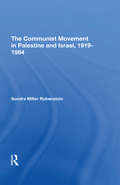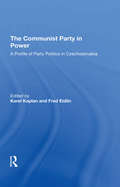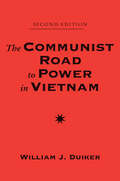- Table View
- List View
The Communist Manifesto
by Karl Marx Frederick EngelsThe Communist Manifesto, originally titled Manifesto of the Communist Party (German: Manifest der Kommunistischen Partei) is a short 1848 book written by the German Marxist political theorists Karl Marx and Friedrich Engels. It has since been recognized as one of the world's most influential political manuscripts. Commissioned by the Communist League, it laid out the League's purposes and program. It presents an analytical approach to the class struggle (historical and present) and the problems of capitalism, rather than a prediction of communism's potential future forms. <p><p> The book contains Marx and Engels' Marxist theories about the nature of society and politics, that in their own words, "The history of all hitherto existing society is the history of class struggles." It also briefly features their ideas for how the capitalist society of the time would eventually be replaced by socialism, and then eventually communism.
The Communist Manifesto
by Friedrich Engels Karl MarxThe Communist Manifest by Marx and Engels with an introduction and notes by Gareth Stedman Jones. Jones reviews the history of the Manifesto as well as the events drove Marx and Engels to create the Communist Manifesto.
The Communist Manifesto
by Friedrich Engels Karl Marx Gareth Stedman JonesThe perfect books for the true book lover, Penguin's Great Ideas series features twelve more groundbreaking works by some of history's most prodigious thinkers. Each volume is beautifully packaged with a unique type-driven design that highlights the bookmaker's art. Offering great literature in great packages at great prices, this series is ideal for those readers who want to explore and savor the Great Ideas that have shaped our world. The Communist Manifesto changed the face of the twentieth century beyond recognition, inspiring millions to revolution, forming the basis of political systems that still dominate countless lives and continuing to ignite violent debate about class and capitalism today.
The Communist Manifesto
by Friedrich Engels Karl MarxThe Communist Manifesto presents the argument that capitalism is by its very nature exploitative and hence is antithetical to freedom. Written in 1848, it became the blueprint for the communist wave that would sweep Europe. It remains a fascinating read.
The Communist Manifesto
by Friedrich Engels Karl MarxThe Communist Manifesto presents the argument that capitalism is by its very nature exploitative and hence is antithetical to freedom.<P><P> Commissioned by the Communist League and originally published in London (in German as Manifest der Kommunistischen Partei) just as the revolutions of 1848 began to erupt, the Manifesto was later recognised as one of the world's most influential political documents. It presents an analytical approach to the class struggle (historical and then-present) and the problems of capitalism and the capitalist mode of production, rather than a prediction of communism's potential future forms. <P>The Communist Manifesto summarises Marx and Engels' theories about the nature of society and politics, that in their own words, "The history of all hitherto existing society is the history of class struggles". It also briefly features their ideas for how the capitalist society of the time would eventually be replaced by socialism. <P>In 2013 The Communist Manifesto was registered to UNESCO's Memory of the World Programme with the Capital, Volume I.
The Communist Manifesto
by Karl Marx Friedrich Engels"A spectre is haunting Europe - the spectre of Communism." So begins one of history's most important documents, a work of such magnitude that it has forever changed not only the scope of world politics, but indeed the course of human civilization. The Communist Manifesto was written in Friedrich Engels's clear, striking prose and declared the earth-shaking ideas of Karl Marx. Upon publication in 1848, it quickly became the credo of the poor and oppressed who longed for a society "in which the free development of each is the condition for the free development of all."The Communist Manifesto contains the seeds of Marx's more comprehensive philosophy, which continues to inspire influential economic, political, social, and literary theories. But the Manifesto is most valuable as an historical document, one that led to the greatest political upheaveals of the nineteenth and twentieth centuries and to the establishment of the Communist governments that until recently ruled half the globe.This Bantam Classic edition of The Communist Manifesto includes Marx and Engels's historic 1872 and 1882 prefaces, and Engels's notes and prefaces to the 1883 and 1888 editions.
The Communist Manifesto
by Karl MarxOne of the world's most influential political manuscripts. Commissioned by the Communist League and written by communist theorists Karl Marx and Friedrich Engels, it laid out the League's purposes and program. It presents an analytical approach to the class struggle (historical and present) and the problems of capitalism, rather than a prediction of communism's potential future forms.
The Communist Manifesto (Penguin Great Ideas)
by Friedrich Engels Karl MarxThroughout history, some books have changed the world. They have transformed the way we see ourselves - and each other. They have inspired debate, dissent, war and revolution. They have enlightened, outraged, provoked and comforted. They have enriched lives - and destroyed them. Now Penguin brings you the works of the great thinkers, pioneers, radicals and visionaries whose ideas shook civilization, and helped make us who we are.
The Communist Manifesto / The April Theses
by Friedrich Engels Karl Marx V. I. Lenin Ali TarigA new beautiful edition of the Communist Manifesto, combined with Lenin's key revolutionary tract"A spectre is haunting Europe..."The Communist Manifesto is the most influential political book ever written - few others have fundamentally changed the world. After the Russian Revolution it became the key text for radicals the world over. Now, in the wake of a punishing financial crisis and on the centenary of the Revolution that it helped to spark, the book remains both an essential guide to the transformations wrought by capitalism and presents the solution to its inequalities and exploitation.There have been many editions of the Manifesto before, but this is a beautifully presented hardback edition and with one key addition - as this book was instrumental in the Russian Revolution it has been coupled with Lenin's April Theses as an attractive 'flip' book (i.e. turn the book upside down and you have another). Lenin presented his ten directives after his return from exile in 1917, and they are the key program for the revolution that was carried out that year.This landmark edition includes a new introduction by Tariq Ali, showing how the Russian Revolution changed the world and the horizon of political change, and why its ambition is still relevant today.From the Hardcover edition.
The Communist Manifesto and Other Revolutionary Writings: Marx, Marat, Paine, Mao Tse-Tung, Gandhi and Others (Dover Thrift Editions)
by Bob BlaisdellThis concise anthology presents a broad selection of writings by the world's leading revolutionary figures. Spanning three centuries, the works include such milestone documents as the Declaration of Independence (1776), the Declaration of the Rights of Man (1789), and the Communist Manifesto (1848). It also features writings by the Russian revolutionaries Lenin and Trotsky; Marat and Danton of the French Revolution; and selections by Jean-Jacques Rousseau, Emma Goldman, Mohandas Gandhi, Mao Zedong, and other leading figures in revolutionary thought.An essential collection for anyone interested in the issues, ideas, and history of the major revolutions of modern times, this book will prove an enlightening companion to students of this genre. Includes a selection from the Common Core State Standards Initiative: The Declaration of Independence.
The Communist Manifesto in the Revolutionary Politics of 1848: A Critical Evaluation (Marx, Engels, and Marxisms)
by David IrelandThis book examines why, on the eve of the pamphlet’s 175th anniversary, the Communist Manifesto left so faint an imprint on Europe’s most revolutionary year of 1848, when it has had such a huge impact on posterity. The Manifesto that year misread bourgeois intentions, put too much faith in the industrial proletariat, too little in peasants, too much emphasis on the German states, and none on England. Marx and Engels preferred in 1848–9 to focus on the middle-class Neue Rheinische Zeitung, declining to galvanise working-class groups whose leadership they had actively sought. They neglected to return swiftly to the German states in their crucial 1848 ‘March days’. The Manifesto’s programme barely overlapped with contemporary campaigners or comparative pamphleteers, or the replacement Demands of the Communist Party in Germany. The book considers the consequences of Marx opting to write the Manifesto alone in January 1848. It also questions the source and significance of the pamphlet’s most memorialised phrase, ‘the spectre of Communism’, whether it was written for the ‘working men of all countries’ addressed in its finale, and whether Marx and Engels regarded the Manifesto as highly in 1848, as they undoubtedly did in later life.
The Communist Manifesto: (manifesto Of The Communist Party; German: Manifest Der Kommunistischen Partei) (Mobi Classics Ser.)
by Karl Marx Frederich Engels Andrew AustinPackaged in handsome, affordable trade editions, Clydesdale Classics is a new series of essential works. From the musings of intellectuals such as Thomas Paine in Common Sense to the striking personal narrative of Harriet Jacobs in Incidents in the Life of a Slave Girl, this new series is a comprehensive collection of our intellectual history through the words of the exceptional few.Originally published as a political pamphlet in 1848, amidst the revolutions in Europe, The Communist Manifesto documents Karl Marx and Friedrich Engels’s theories on society and politics. It does so by defining the state of the class system in contemporary Europe—in which a larger, lower class is controlled and oppressed by a tyrannical, oppressive upper class. The Manifesto argues that, at some point in history, the lower class will inevitably realize their potential and exploitation and subsequently revolt. Once this occurs, Marx and Engels argue, there will be an uprising among proletariats that shifts political and economic power, ultimately resulting in the dismantling of class systems and capitalism. Additionally, in the Manifesto, Marx and Engels also predict the future state of the global economy and discuss their viewpoints on private property, while also addressing many other topics pertinent to today’s world.Although written nearly 170 years ago, The Communist Manifesto is still widely read and cited. Amid the current turmoil between social classes and the societies of the world, its revolutionary prose and ideas can still yield ripe food for thought.
The Communist Manifesto: (manifesto Of The Communist Party; German: Manifest Der Kommunistischen Partei) (Mobi Classics Ser.)
by Friedrich Engels Karl MarxThe Communist Manifesto was first published in London in 1848 by two young men in their twenties, Karl Marx and Friedrich Engels, and its impact reverberated across the globe and through the next century. Foreshadowing globalization 150 years before it happened, the Manifesto brims with prescient insights into the crisis facing capitalism today. It is an essential read for anyone seeking to understand the modern political landscape. This edition includes a new introduction by the bestselling author of And the Weak Suffer What They Must? and Talking to My Daughter About the Economy, Yanis Varoufakis.
The Communist Manifesto: A Modern Edition (Mobi Classics Ser.)
by Friedrich Engels Karl Marx Eric HobsbawmIn the two decades following the fall of the Berlin Wall, global capitalism became entrenched in its modern, neoliberal form. Its triumph was so complete that the word "capitalism" itself fell out of use in the absence of credible political alternatives. But with the outbreak of financial crisis and global recession in the twenty-first century, capitalism is once again up for discussion. The status quo can no longer be taken for granted.As Eric Hobsbawm argues in his acute and elegant introduction to this modern edition, in such times The Communist Manifesto emerges as a work of great prescience and power despite being written over a century and a half ago. He highlights Marx and Engels's enduring insights into the capitalist system: its devastating impact on all aspects of human existence; its susceptibility to enormous convulsions and crises; and its fundamental weakness.
The Communist Manifesto: The Authorized English Translation, Edited and Annotated by Friedrich Engels
by Friedrich Engels Karl MarxOne of the world's most influential political treatises, The Communist Manifesto outlines the base principles of communism as they relate to class struggle, economics, and politics.Originally published in 1848 as the Manifesto of the Communist Party, The Communist Manifesto was foundational to the development of modern communism and socialism.
The Communist Manifesto: The Political Classic (Capstone Classics)
by Friedrich Engels Karl MarxDISCOVER THE WORK THAT LAUNCHED REVOLUTIONS AROUND THE WORLD Although it was published in 1848, The Communist Manifesto is as controversial and provocative as ever. Its stirring and poetic language helped spread Marx and Engels' socialist message far and wide, unleashing a century of political revolution. In an age of great inequality, the Manifesto's message of an exploited and suffering working class that must rise up and claim the means of production and wealth continues to resonate. This deluxe edition features an insightful introduction from Tom Butler-Bowdon which explains how the text came to be written, and why it remains popular.
The Communist Manifesto: With Related Documents
by Karl Marx Frederick Engels“Communists have no interests separate and apart from those of the proletariat as a whole. Their theoretical conclusions are in no way based on ideas or principles that have been invented, or discovered, by this or that would-be universal reformer. They merely express, in general terms, actual relations springing from an existing class struggle, from a historical movement going on under our very eyes.” Why is all recorded history “the history of class struggles”? Why is the capitalist state “but a committee for managing the common affairs of the whole bourgeoisie”? Why does capital’s need of a constantly expanding market “chase the bourgeoisie over the whole surface of the globe”? Why is “the proletarian movement the self-conscious movement of the immense majority, in the interests of the immense majority”? Why does the fight “for the proletariat organized as the ruling class” open the only way forward for humanity? These questions—addressed by Karl Marx and Frederick Engels in the historic program of the first modern communist workers organization—remain as vital today as they were more than a century and a half ago.
The Communist Movement In Palestine And Israel, 1919-1984
by Sondra M RubensteinThis book traces the origin and development of the communist movement in Palestine and Israel, examining in detail the problems affecting It In the years preceding Israeli statehood In 1948. focusing on these problems within the context of events in the Ylshuv (the Jewish community in Palestine) and the International communist movement, Dr. Rubenstein analyzes unpopular positions advocated by the Communist party, Its efforts to remain loyal to Moscow's dictates, and the succession of rifts within the movement. Concludes with an overview of the communist movement In Israel today, Dr. Rubenstein explains the virtual extinction of party influence on the current lsraeli political scene.
The Communist Movement in the Arab World (Durham Modern Middle East and Islamic World Series #Vol. 7)
by Tareq Y. IsmaelThis book examines the communist movement in the Arab world from the time of the Russian revolution until after the collapse of the Soviet Union. It traces the interaction of the world communist movement which was characterized by an uncritical acceptance of Marxism-Leninism, and local communists, who moved from initial dependence on Moscow to a position more adapted to local circumstances and sensitivities that could be characterized as a distinctive 'Arab communism'. It goes on to trace the impact of 'Arab communism' on a range of issues in the region, arguing that the role of Arab communist parties was highly significant, and disproportionate to the relatively small numbers of communists in the countries concerned.
The Communist Parties of Italy, France and Spain: Postwar Change and Continuity A Casebook (Routledge Revivals)
by PETER LANGE; MAURIZIO VANNICELLIFirst published in 1981, The Communist Parties of Italy, France, and Spain presents a comparative and integrative overview of the development of three Communist parties in the postwar Europe. Through the systematic presentation of the most important documents of the Communist parties, the book provides an access to the basic declarations and positions to illustrate the strategic and ideological evolution of these three parties in the advanced industrial democracies. Eurocommunism, the editors argue cannot be usefully understood as a phenomenon which suddenly appeared and equally as rapidly disappeared, in the 1970s. Rather it is a process of adaptation and change which characterizes the development of all three parties since World War II. The explicitly comparative organisation of the documents into five basic themes -general strategy, alliances, party organization, international policy, policy toward the communist movement, allows the reader both to follow any single party in a specific policy area or to compare the parties in response to major domestic or international events of significance. Rich in archival material, this book will be an invaluable resource to scholars and researchers of European Politics, comparative politics, comparative communism and modern European history. .
The Communist Party In Power: A Profile Of Party Politics In Czechoslovakia
by Karel Kaplan Fred H EidlinThe aim of this book is simple. It seeks to describe the main features of the internal life and functioning of a communist party. It reflects both the results of a historian's research and the long years of experience of a communist official and party apparatchik.
The Communist Party of Indonesia 1951-1963
by Donald HindleyThis title is part of UC Press's Voices Revived program, which commemorates University of California Press’s mission to seek out and cultivate the brightest minds and give them voice, reach, and impact. Drawing on a backlist dating to 1893, Voices Revived makes high-quality, peer-reviewed scholarship accessible once again using print-on-demand technology. This title was originally published in 1964.
The Communist Postscript
by Boris Groys Thomas FordSince Plato, philosophers have dreamed of establishing a rational state ruled through the power of language. In this radical and disturbing account of Soviet philosophy, Boris Groys argues that communism shares that dream and is best understood as an attempt to replace financial with linguistic bonds as the cement uniting society. The transformative power of language, the medium of equality, is the key to any new communist revolution.From the Hardcover edition.
The Communist Road To Power In Vietnam: Second Edition
by William J DuikerIn this new edition of his widely acclaimed study, William Duiker has revised and updated his analysis of the Communist movement in Vietnam from its formation in 1930 to the dilemmas facing its leadership in the post-Cold War era. Making use of newly available documentary sources and recent Western scholarship, the author reevaluates Communist revolutionary strategy during the Vietnam War. Based on primary materials in several languages, this respected work is essential for an understanding of Vietnam in the twentieth century.
























